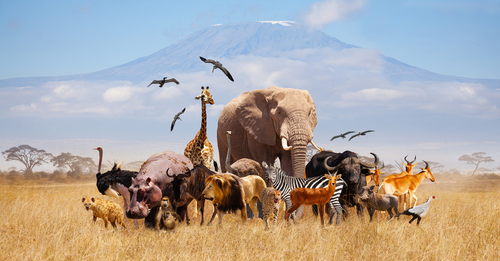In South Africa’s Kruger National Park, poachers have wreaked ecological havoc by poisoning an elephant with agricultural pesticides and killing 123 vultures. Described as one of the worst in the park’s history, the mass poisoning incident highlights yet another danger to wildlife conservation. It may make it easier for animal parts to be illegally harvested for the black market.
Foreign Poachers Decimate Protected Wildlife
South African authorities have reported that over 120 vultures died after consuming a poisoned elephant carcass in Kruger National Park, a deliberate act by poachers seeking to harvest elephant parts. The incident represents a growing crisis of chemical warfare against wildlife, with poachers increasingly using agricultural toxins to eliminate these natural “clean-up crews” that would otherwise expose their illegal activities.
A shocking 123 vultures died in South Africa’s Kruger National Park after eating a poisoned elephant carcass left by poachers. The toxic trap killed endangered species like white-backed & hooded vultures, who help keep ecosystems clean by eating dead animals. Devastating news❗️ pic.twitter.com/b1SnXlgxL7
— Xpose Trophy Hunting (@XposeTrophyHunt) May 8, 2025
The mass poisoning occurred at the beginning of the vulture breeding season, potentially causing even greater ecological damage than initially reported. Park rangers, already stretched thin across the 20,000 square kilometer preserve (nearly twice the size of Jamaica), continue facing an uphill battle against sophisticated poaching operations targeting high-value species like elephants, rhinos, and lions.
Endangered Species Face Critical Threat
The poisoning affected multiple endangered vulture species, including Cape vultures, lappet-faced vultures, and critically endangered white-backed and hooded vultures. Rescue teams managed to save 83 poisoned vultures, which are now recovering under veterinary care, though the long-term impact on these already threatened populations remains concerning.
𝗩𝗨𝗟𝗧𝗨𝗥𝗘𝗦 𝗙𝗢𝗨𝗡𝗗 𝗗𝗘𝗔𝗗 𝗙𝗥𝗢𝗠 𝗣𝗢𝗜𝗦𝗢𝗡𝗜𝗡𝗚 𝗜𝗡 𝗧𝗛𝗘 𝗞𝗥𝗨𝗚𝗘𝗥 𝗡𝗔𝗧𝗜𝗢𝗡𝗔𝗟 𝗣𝗔𝗥𝗞
A total of 116 vultures were found dead due to a devastating poisoning incident in the Mahlangeni Section of the Kruger National Park.
The vultures died after… pic.twitter.com/Wf5SVCvhsg
— Limpopo Chronicle (@LimChronicle) May 8, 2025
Vultures serve a vital role in ecosystem health by consuming dead animal carcasses, preventing the spread of diseases like anthrax and rabies. Their scavenging behavior makes them particularly vulnerable to poisoning tactics employed by poachers who deliberately target these birds to avoid detection while harvesting valuable animal parts for illegal markets.
Conservation Crisis Demands Stronger Response
“This horrific incident is part of a broader crisis unfolding across southern Africa: the escalating use of poisons in wildlife poaching,” stated officials from SANParks and the Endangered Wildlife Trust. The poisoning represents another challenge for conservation authorities battling numerous threats to Africa’s iconic wildlife species and protected lands.
“Poachers increasingly use agricultural toxins to target high-value species,” warned conservation organizations involved in the investigation. The incident highlights the ongoing struggle to protect Africa’s wildlife heritage from increasingly sophisticated criminal networks exploiting natural resources for profit without regard for ecological consequences.
South African authorities have launched an investigation into this specific poisoning incident while working to strengthen anti-poaching measures throughout the park system. Conservation experts emphasize that more vigorous enforcement, better detection methods, and harsher penalties for wildlife crimes are essential to prevent similar ecological disasters from continuing across the continent’s protected areas.
Sources:
https://www.independent.co.uk/bulletin/news/vultures-poisoned-south-africa-park-b2747169.html

